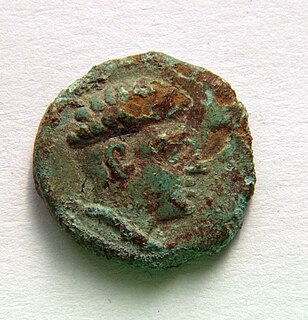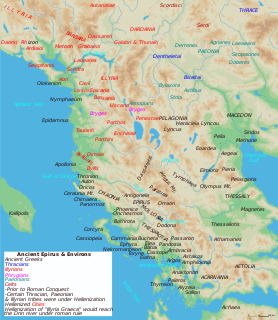Plator (? –169 BC) the Illyrian was brother to King Gentius, the last Illyrian king of the Ardiaean State.

The Illyrians were a group of Indo-European tribes in antiquity, who inhabited part of the western Balkans. The territory the Illyrians inhabited came to be known as Illyria to Greek and Roman authors, who identified a territory that corresponds to Croatia, Bosnia and Herzegovina, Slovenia, Montenegro, part of Serbia and most of central and northern Albania, between the Adriatic Sea in the west, the Drava river in the north, the Morava river in the east and the mouth of the Aoos river in the south. The first account of Illyrian peoples comes from the Periplus of Pseudo-Scylax, an ancient Greek text of the middle of the 4th century BC that describes coastal passages in the Mediterranean.

Gentius was a king of the Ardiaei, a powerful tribe in Illyria. He ruled in 181–168 BC, being the last Ardiaei ruler.
Contents
Plator may have been killed because he wanted to marry Etuta in 169 BC. [1] She was the daughter of Monunius [2] and was married [3] to Gentius himself.
Etuta was an Illyrian queen of the Ardiaean Kingdom. Etuta was a Dardanian princess of the Dardanian State and daughter of Monunius II of Dardania. Etuta married Gentius in 169 BC.
The personal name Plator was very common among Illyrians, attested among the southern Illyrians, Delmatae, and Pannoni; sometimes in lands north of the Delmatae it was also spelled Pletor. The name is also found in derivatives such as Platino and Platoris. Among the Liburnians the name is found as Plaetor; among the Veneti as Plaetorius. [4] The gens name Plaetorius is also found among the Romans, and a Gaius Plaetorius was one of the three ambassadors sent to King Gentius on behalf of Rome's allies. [5]

The Liburnians were an ancient Illyrian tribe inhabiting the district called Liburnia, a coastal region of the northeastern Adriatic between the rivers Arsia (Raša) and Titius (Krka) in what is now Croatia. According to legend they populated Kerkyra until shortly after the Corinthians settled the island, c. 730 BC.

The Veneti were an Indo-European people who inhabited northeastern Italy, in an area corresponding to the modern-day region of Veneto.
In ancient Rome, a gens, plural gentes, was a family consisting of all those individuals who shared the same nomen and claimed descent from a common ancestor. A branch of a gens was called a stirps. The gens was an important social structure at Rome and throughout Italy during the period of the Roman Republic. Much of an individual's social standing depended on the gens to which he belonged. Certain gentes were considered patrician, others plebeian, while some had both patrician and plebeian branches. The importance of membership in a gens declined considerably in imperial times.






